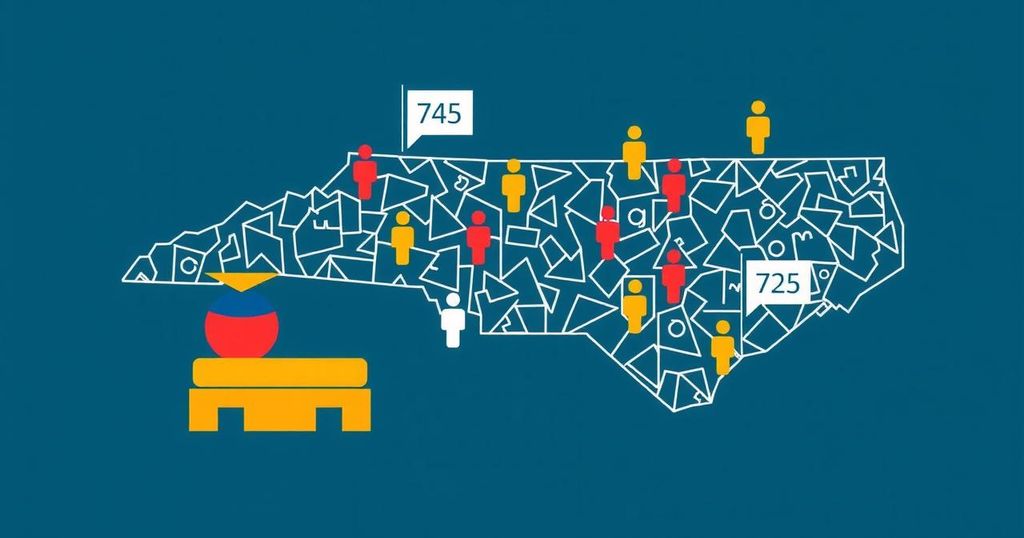World news
AFRICA, CIVIL RIGHTS, COUNCIL OF STATE, DEAN, DEANNA TOWNSEND - SMITH, DEMOCRATS, ELECTION, ELECTION INTEGRITY, GOP, GREEN, JOSH STEIN, LEGISLATION, MICHELE MORROW, MO GREEN, NC, NORTH CAROLINA, PRESIDENTIAL ELECTION 2024, PUBLIC INSTRUCTION, RACHEL HUNT, REPUBLICAN, ROY COOPER, SOUTH AFRICA, STEIN, VIRGINIA
Marisol Gonzalez
0 Comments
Implications of North Carolina’s 2024 Election Outcomes for Public Education
The 2024 elections in North Carolina have led to a shift in educational leadership with Democrat Mo Green as the new superintendent. This change opens prospects for increased funding and collaborative governance in public education. However, the legislative power dynamics, especially regarding the potential for a Republican supermajority, may influence future policies and funding decisions significantly.
The 2024 elections in North Carolina have ushered in a new era for public education, marked by a split power dynamic in the state’s political landscape. With the election of Democrat Mo Green as the new superintendent of public instruction and significant wins for Democrats in key council positions, there is potential for either political maneuvering or collaborative governance. Green, alongside newly elected officials, aims to enhance public school funding and the educational experience for all students. However, the influence of the legislature, especially with its potential to regain a supermajority, remains a crucial factor in shaping public education policies moving forward. Green has positioned himself as a proponent of increased educational investment, focusing on areas such as early learning, teacher salaries, and resources for disadvantaged students. His campaign was driven by a commitment to address the underfunding of schools and the need to respect educators by improving their working conditions. As he assumes office, he seeks to foster collaboration with community organizations to create safer and more supportive school environments, emphasizing the importance of mental health resources over traditional disciplinary methods. Environmental conditions in North Carolina’s education system are a mix of optimism and caution. While educators like Justin Parmenter express hope that the shift in power dynamics will lead to increased support for public schools, they remain skeptical about the Republican party’s willingness to pivot from its recent focus on funding alternatives to traditional school systems. The dynamics of collaboration versus contention will be critical to the success of educational reforms in the state. The State Board of Education is set to navigate through these changes, with Green now at its helm. However, the state legislature retains significant authority over educational policy creation, influencing teacher pay and operational timelines for schools. Green’s administration will need to manage relationships with a board largely appointed by the previous Democratic governor, while also addressing the potential challenges posed by Republican efforts to limit the Board’s power. The landscape of education in North Carolina underscores the essential balance of power necessary to ensure that schools are adequately funded and maintained. As stakeholders await finalized election results that could reinforce or diminish the gains made by the Democrats, the overarching objective remains clear: to prioritize public education and the welfare of students throughout the state.
The 2024 North Carolina elections brought significant changes to the state’s educational landscape, with Democrats winning key positions including the superintendent and several council seats. This shift raises questions about how these new leaders will influence public education policies. Historically, public schools have faced funding challenges, and the recent election results may shift the strategies employed by legislators who have previously focused on diverting funds to private education options, such as school vouchers. The new leaders will need to navigate the existing dynamics of the state legislature, which holds substantial power over educational policy.
In conclusion, the recent election results in North Carolina present both opportunities and challenges for public education. As new leaders advocate for increased funding and improved support for educators and students, the role of the legislature will be crucial. The dialogue surrounding education will require collaboration among stakeholders to truly enhance the public school system. The outcome of the ongoing political discussions will ultimately determine the future direction of education policy in North Carolina.
Original Source: www.charlotteobserver.com




Post Comment